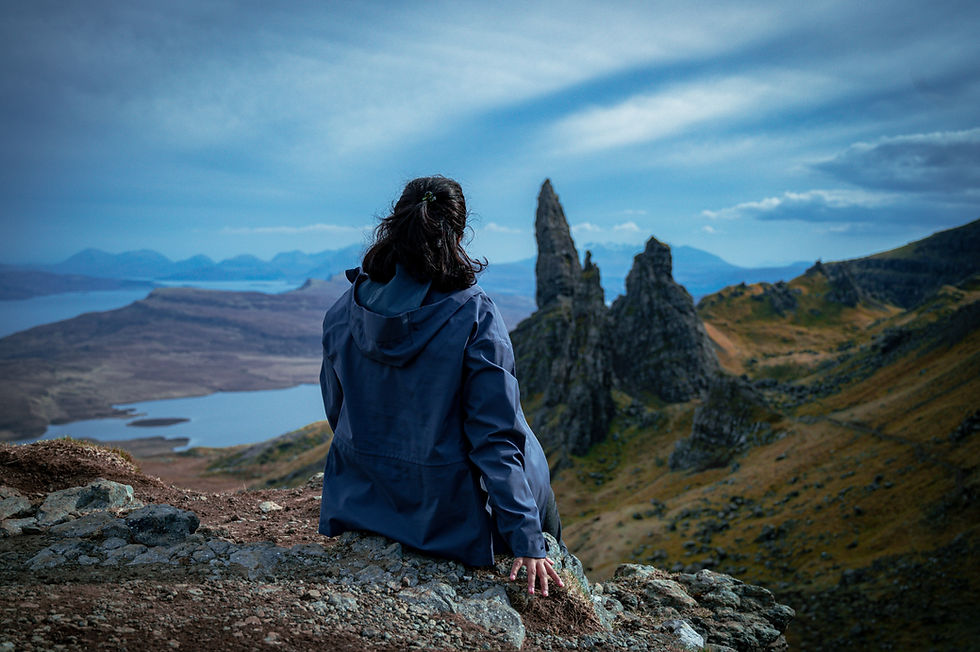What is "wild camping" in a campervan?
- VanLife.uk

- Mar 13, 2023
- 4 min read
Wild camping in a campervan in the UK typically means camping overnight in a location that is not an official campsite or designated camping area. It usually involves parking up and staying overnight in a remote or secluded spot in the countryside or on the coast, away from other people and amenities.

While it is legal to park a campervan in many public areas in the UK, such as on some roads and laybys, wild camping is often prohibited or restricted in many places. It's important to check local regulations and guidelines before engaging in wild camping.
In addition, it's important to practice responsible wild camping, which includes leaving no trace, respecting the environment and local communities, and ensuring that you are not causing any damage or disturbance. Some areas may have specific rules and restrictions on camping in a campervan, such as limiting the number of nights you can stay in one location or requiring you to use a designated camping area.
Here are some ways you can check if you are allowed to wild camp in a spot overnight.
Research local regulations and guidelines - Check the local area's website or tourism board for information on camping regulations and guidelines. This information will help you understand where you are allowed to park up and camp overnight.
Use camping apps or websites - There are many camping apps and websites that provide information on campsites and wild camping spots. These apps can help you find legal and safe places to park up and camp overnight.
Ask locals - Ask locals for advice on where to park up and camp overnight. Locals will have a good understanding of the local area and can provide valuable advice on where to camp safely and legally.
Check with landowners - If you are planning to camp on private land, be sure to check with the landowner for permission before setting up camp. This will help you avoid any legal issues and ensure that you are camping responsibly.
When wild camping in a campervan overnight, there are several do`s and don'ts to keep in mind to ensure that you are camping responsibly and respecting the environment and local communities. Here are some of the most important do`s and don'ts to follow:
Do`s
Choose a legal and safe spot - Always choose a legal and safe spot to park up and camp overnight. Be sure to check local regulations and guidelines before camping in any area.
Leave no trace - Leave no trace by packing out all your trash and leaving the campsite as you found it. Avoid damaging the environment and be respectful of the natural surroundings.
Be respectful of others - Be respectful of other campers and local communities by keeping noise levels low and not disturbing others.
Be self-sufficient - Be self-sufficient by bringing enough food, water, and supplies for your trip. Avoid using campfires or leaving trash behind.
Respect wildlife - Respect wildlife by observing from a safe distance and not disturbing their natural habitats.
Don'ts
Don't camp on private land without permission - Always seek permission from the landowner before camping on private land.
Don't make excessive noise - Avoid making excessive noise that may disturb other campers or local communities.
Don't use campfires - Avoid using campfires as they can damage the environment and may be prohibited in some areas.
Don't leave trash behind - Pack out all your trash and dispose of it properly. Leaving trash behind can damage the environment and harm wildlife.
Don't damage the environment - Avoid damaging the environment by not cutting down trees, disturbing wildlife, or leaving marks on the landscape.
By following these dos and don'ts, you can ensure that you are camping responsibly and safely while enjoying the beauty of the great outdoors.
There are many beautiful and secluded spots to wild camp in a campervan in the UK, but it's important to note that wild camping is not legal in all areas.
Here are some of the best places to wild camp in a campervan in the UK:
Scottish Highlands - Scotland's vast and rugged wilderness offers some of the most stunning and remote spots to wild camp in a campervan. There are many scenic routes to explore, such as the North Coast 500.
Dartmoor National Park - This beautiful and expansive national park in Devon offers many scenic spots to wild camp, such as secluded moorland and riverside locations.
Lake District National Park - The Lake District is home to some of the most stunning scenery in the UK, with many picturesque locations to park up and camp overnight.
Welsh Mountains - The Welsh Mountains offer many remote and secluded spots to wild camp, with stunning views of the surrounding valleys and peaks.
Cornwall - Cornwall is home to many beautiful coastal spots to park up and camp overnight, such as secluded coves and beaches.
Peak District National Park - This scenic national park in central England offers many picturesque spots to park up and camp overnight, such as secluded valleys and hilltops with stunning views.
Snowdonia National Park - This rugged and remote national park in Wales is home to many beautiful spots to wild camp, such as secluded lakes and waterfalls.
Norfolk Coast - The Norfolk Coast offers many beautiful coastal spots to park up and camp overnight, such as secluded beaches and cliff tops with stunning views.
Yorkshire Dales National Park - This picturesque national park in northern England offers many scenic spots to wild camp, such as remote valleys and hilltops with panoramic views.
Scottish Islands - Scotland's remote islands offer some of the most stunning and secluded spots to wild camp in a campervan, with pristine beaches and crystal-clear waters. Some of the most popular islands for wild camping include Skye, Mull, and Islay.



